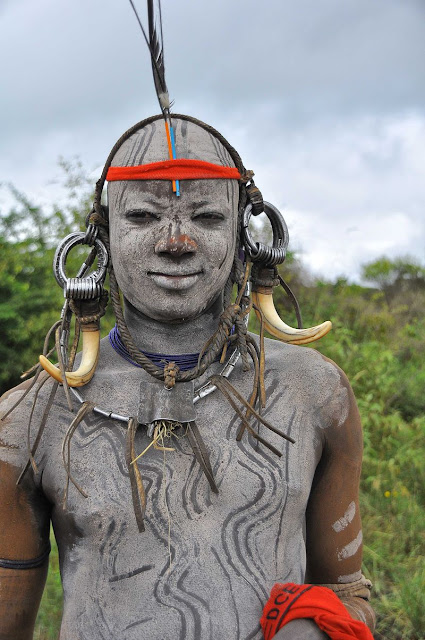Morsi tribe of Ethiopia. They live in the most isolated regions of Omo river valley. They are unique for wearing their traditional headdresses and the women also wear clay or wooden plates in their lower lips and ear lobes meant to mark traditional rights of passage from age 15 to 16.
The Mursi (or Mun as they refer to themselves) are a Nilotic pastoralist ethnic group in Ethiopia. They principally reside in the Debub Omo Zone of the Southern Nations, Nationalities, and People's Region, close to the border with South Sudan. According to the 2007 national census, there are 7,500 Mursi, 448 of whom live in urban areas; of the total number, 92.25% live in the Southern Nations, Nationalities, and People's Region (SNNPR).
Surrounded by mountains between the Omo River and its tributary the Mago, the home of the Mursi is one of the most isolated regions of the country. Their neighbours include the Aari, the Banna, the Bodi, the Karo, the Kwegu, the Nyangatom and the Suri. They are grouped together with the Me'en and Suri by the Ethiopian government under the name Surma.
Scroll down for more.....
Mursi Women carrying a baby
The bigger the disc the more beautiful it will be considered
Two Mursi men are having a talk while others are playing games in the shadow
Mursi man covering his body with ashes
The Mursi undergo various rites of passage, educational or disciplinary processes. Lip plates are a well-known aspect of the Mursi and Surma, who are probably the last groups in Africa amongst whom it is still the norm for women to wear large pottery or wooden discs, or ‘plates,’ in their lower lips. Girls' lips are pierced at the age of 15 or 16. Occasionally lip plates are worn to a dance by unmarried women, and increasingly they are worn to attract tourists in order to earn some extra money.
Ceremonial duelling (thagine), a form of ritualised male violence, is a highly valued and popular activity of Mursi men, especially unmarried men, and a key marker of Mursi identity. Age sets are an important political feature, where men are formed into named "age sets" and pass through a number of "age grades" during the course of their lives; married women have the same age grade status as their husbands.
Source: Wikipedia



